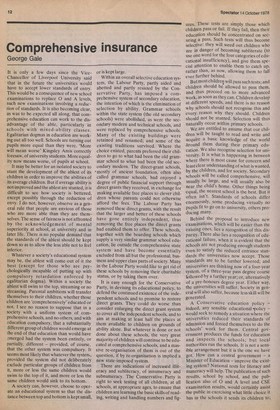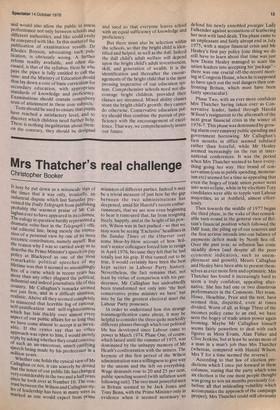Comprehensive insurance
George Gale
It is only a few days since the ViceChancellor of Liverpool University said that in the future the universities would have to accept lower standards of entry. This would be a consequence of new school examinations to replace 0 and A levels, such new examinations involving a reduction of standards. It is also becoming clear, as was to be expected all along, that comprehensive education can work to the disadvantage of the able, particularly in schools with mixed-ability classes. Egalitarian dogmas in education are working out all too well. Schools are turning out pupils more equal than they were. 'More will mean worse' Kingsley Amis correctly foresaw, of university students. More equality now means worse, of pupils at school.
It may be better for an isolated society to stunt the development of the ablest of its children in order to improve the abilities of its average children. But if average ability is not improved and the ablest are stunted, it is difficult to see how society is bettered, except possibly through the reduction of envy. I do not, however, observe as a general rule that people are envious of those who are more able than they are them selves. The sense of fairness is not affronted by the acknowledgement of mental superiority at school, at university and in later life. There is no popular demand that the standards of the ablest should be kept down so as to allow the less able not to feel inferior.
Whatever a society's educational system may be, the ablest will come out of it the best (except for those who are psy chologically incapable of putting up with compulsory retardation enforced by egalitarian dogma). Within a society the ablest will swim to the top, streaming or no streaming. Parental ambitions will transfer themselves to their children, whether those children are 'comprehensively' educated or not. I see no reason to suppose that in a society with a uniform system of com prehensive schools, and no others, and with education compulsory, that a substantially different group of children would emerge at the end of that education than would have emerged had the system been entirely, or partially, different — provided, of course, that the other system was compulsory. It seems most likely that whatever the system, provided the system did not deliberately exclude particular groups of children from it, more or less the same children would swim to the top of it, and more or less the same children would sink to its bottom.
A society can, however, choose to operate an educational system so that the distance between top and bottom is kept small, or is kept large.
Within an overall selective education system, the Labour Party, partly aided and abetted and partly resisted by the Conservative Party, has imposed a comprehensive system of secondary education, the intention of which is the elimination of selection by ability. Grammar schools within the state system (the old secondary schools) were abolished, as were the secondary modern and technical schools, and were replaced by comprehensive schools. Many of the existing buildings were retained and renamed; and some of the existing traditions survived. Where the choice existed, parents preferred their chil dren to go to what had been the old gram mar school to what had been the old secondary modern. The direct-grant schools, • mostly of ancient foundation, often also called grammar schools, had enjoyed a degree of public financial support through direct grants they received, in exchange for making available free places to clever chil dren whose parents could not otherwise afford the fees. The Labour Party has removed these direct grants, with the result that the larger and better of these schools have gone entirely independent, thus removing the free places the direct grants had enabled them to offer. These schools, together with the boarding schools which supply a very similar grammar school edu cation, lie outside the comprehensive state system and have become essentially excluded from all but the professional, bus iness and upper class parts of society. Many in the Labour Party would like to get rid of these schools by removing their charitable status, or by taking them over.
It is easy enough for the Conservative Party, in devising its educational policy, to defend the continued existence of the inde pendent schools and to promise to restore direct grants. They could do worse than consider enlarging the direct grant system to cover all the independent schools, and to aim at making at least half the places at them available to children on grounds of ability alone. But whatever is done or not done about these schools, the very great majority of children will continue to be educated at comprehensive schools, and a massive re-organisation of them is out of the question, if by re-organisation is implied a new state-imposed system.
There are indications of increased illiteracy and subliteracy, of innumeracy and subnumeracy. The Conservative Party is right to seek testing of all children, at all schools, at appropriate ages, to ensure that children are learning the basic skills of reading, writing and handling numbers and fig tires. These tests are simply those which children pass or fail. If they fail, then their education should be concentrated on sec uring a pass. Such tests will thus become selective: they will weed out children who are in danger of becoming subliterate (to use one word for the four categories of educational insufficiency), and give them spe cial attention to enable them to catch up, rather than, as now, allowing them to fall ever further behind.
But most children will pass such tests; and children should be allowed to pass them, and thus proceed on to more advanced work, as soon as they can. Children develop at different speeds, and there is no reason why schools should not recognise this and every reason why they should. Children should not be stunted. Selection will thus naturally occur within primary schools.
we are entitled to assume that our children will be taught to read and write and acquire a basic knowledge of the world Around them during their primary education. We also recognise selection for university. It is what is happening in between where there is most cause for concern and least clear understanding of what is wanted, by the children, and for society. Secondary schools will be called comprehensive, will usually be large, and will usually also be near the child's home. Other things being equal, the nearest school is the best. But it often isn't. Standards of schools differ enormously, some producing virtually no pupils fit to go on to university, others producing many.
Behind the proposal to introduce new examinations, which will be easier than the existing ones, lies a recognition of this dis parity. There also lies a recognition of educational failure, when it is evident that the schools are not producing enough students even to satisfy the reduced entrance standards the universities now accept. Those standards are to be further lowered; and universities are thinking now of a four-year system, of a three-year pass degree course followed by a further year; or, alternatively of a pre-honours degree year. Either way, the universities will suffer. Society in general will also suffer, because less skill will be generated.
A Conservative education policy — indeed, any sensible educational -policy — would seek to remedy a situation where the universities reduced their standards of admission and forced themselves to do the schools' work for them. Central government produces the funds for education and inspects the schools; but local authorities run the schools. It is not a sensible arrangement but it is the one we have got. How can a central government — a Minister of Education — improve the existing system? National tests for literacy and numeracy will help. The publication of such results, school by school, and the publication also of 0 and A level and CSE examination results, would certainly assist the public in exercising what little choice it has in the schools it sends its children to; and would also allow the public to assess Performance not only between schools and different authorities, and like could easily be compared with like. In this matter of the Publication of examination results, Dr Rhodes Boyson, advocating such publication, is obviously wrong. A further reform readily available, and often discussed, is that of the syllabus. Here he who pays the piper is fully entitled to call the tune: and the Ministry of Education should thus lay down a core of basic curriculum, for secondary education, with appropriate standards of knowledge and proficiency. Examinations should contain compulsory tests of attainment in these core subjects. Tests should be used to ensure that pupils have reached a satisfactory level, end to discover which children need further help. There is nothing inegalitarian about them: on the contrary, they should be designed and used so that everyone leaves school with an equal sufficiency of knowledge and proficiency. But there must also be selection within the schools, so that the bright child is identified and helped, as well as the dull. Indeed the dull child's adult welfare will depend upon the bright child's adult inventiveness, skill, and generation of wealth. It is the identification and thereafter the encouragements of the bright child that is the most pressing imperative of our education system. Comprehensive schools need not discourage bright children, provided their classes are streamed. Mixed ability classes stunt the bright child's growth: they cannot do otherwise. Conservative education policy should thus combine the pursuit of proficiency with the encouragement of excellence. That way, we comprehensively insure our future.



































 Previous page
Previous page